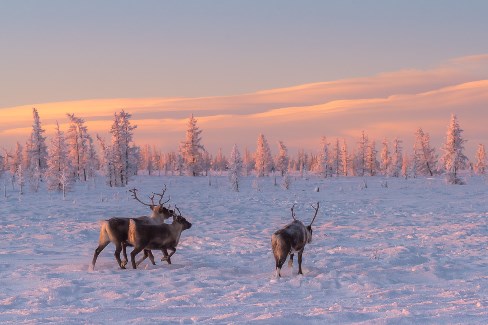
News
Interdisciplinary Field Course "Arctic Interdisciplinary Research - ARCTIS2020" in the Russian Arctic

On February 17-23, 2020, on the threshold of the Siberian Arctic, in the Khanty-Mansiysk Autonomous Okrug (KhMAO), an interdisciplinary field course "Arctic interdisciplinary research - ARCTIS2020" was organized in the Russian Arctic.
The organizers were the Association of Young Polar Scientists in Russia (APECS Russia) and the Great Britain Polar Network (UK Polar Network) in cooperation with the Kola Science Center of the Russian Academy of Sciences, Ugra State University, with the support of the UK Scientific and Innovation Network, as well as the British Embassy in Moscow.
The course program was developed in the framework of the following main directions: cryosphere, atmosphere, terrestrial / ecological research, including hydrology, as well as the humanities, which include the development of both practical and theoretical skills of young scientists and the exchange of experience and knowledge at the level of cooperation between the two countries.
Senior masters and graduate students, as well as young scientists (no more than 5 years after the defense) could take part in the course.
The final stage of work on the course was the development of several joint interdisciplinary research projects, as well as substantiation of the importance of international interdisciplinary field courses for the comprehensive implementation of the Arctic Council Agreement (2017) to strengthen scientific cooperation in the Arctic.
The event was attended by 40 young scientists and 6 teachers from Russia and Great Britain. On the Russian side, the lecturers represented Yugorsk, Tomsk and Tyumen State Universities; with the British - British Antarctic Survey, University of Bristol, University of Oxford. Participants from Great Britain were students from Southampton, Leeds, Cambridge, Edinburgh, Manchester and other leading universities in Great Britain. Among the Russian participants were young scientists, students and graduate students from the KSC RAS, YuGU, Tyumen State University, Moscow State University named after M.V. Lomonosov and other Russian universities and institutes of the Russian Academy of Sciences. Young scientists and experts from Russia and the UK worked together throughout the course, and also established active contacts with local representatives of the Arctic communities (with representatives of the oil industry, environmental groups, the regional administration, as well as the indigenous population).
During the week, young scientists attended theoretical lectures on topical field research topics in polar regions such as ice dynamics, biodiversity, social development and indigenous peoples. Also, the students took part in practical seminars of the field station of YSU "Mukhrino". An important area of the course was the development of skills in writing grant applications, for which the participants were divided into teams. The topics of the applications were to be related to the current problems of the development of the Arctic.
“We wanted the course participants to acquire new theoretical and practical knowledge about the development of the polar regions from leading scientists in their fields. But most importantly, we got the opportunity to work in interdisciplinary teams, ”explained the practical value of the course, one of the organizers of ARCTIS2020, associate professor at the Higher School of Economics and curator of the direction“ Public Geography and Spatial Solutions ”Maria Gunko.
“The Arctic is a territory where different interests clash, therefore it is important to establish a dialogue for its sustainable development. We, as scientists, along with indigenous peoples, businesses and managers, are the stakeholders of the Arctic development, therefore we must learn to listen and hear each other. First of all, my colleagues, even if our objects, subjects and research methods are very different, - said Maria Gunko. - Interdisciplinarity is the new black in science. Events like ARCTIS serve as an excellent platform for making new professional and personal contacts, as well as for broadening one's horizons in general: what kind of research is relevant, how it is carried out. All this will be very useful in further building a career track. Especially in the scientific and educational sphere ”.
The field course "Arctic interdisciplinary research - ARCTIS" was held for two years in a row at the end of February in the northern regions of Russia. In 2019, it was held in the Murmansk region in the cities of Apatity and Kirovsk.


